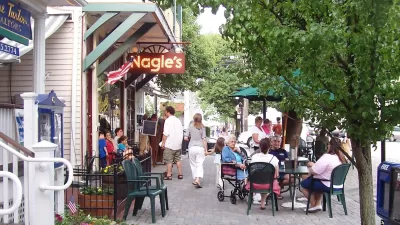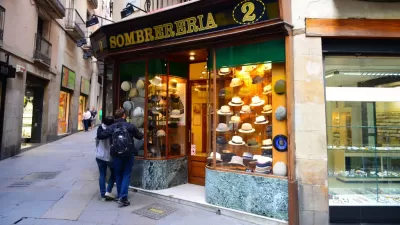North America
2013: A Banner Year for Bike Share
No less than eighteen U.S. cities are expected to launch bike-share systems this year, a fifty percent increase over the number currently in operation. An infographic from bike sharing consultancy BikeShare.com details the new programs.
America's Most Endangered Waterways
In time for Earth Day, American Rivers has released its annual list of the country's most threatened rivers. Topping this year's list is the Colorado River, a waterway so dammed, diverted and over-tapped that it ultimately "dries to a trickle."
Migration of American Indians Transforms Cities and Reservations
The last several decades have seen a mass migration of American Indians from reservations to North America's urban areas, but federal funds that are supposed to assist them have not followed. Answers are elusive for how to stem endemic poverty.
In Rethinking Shared Spaces, Sidewalks Take Center Stage
Joe Nickol pens a paean to the often overlooked sidewalk: "our neighborhood's breadwinner, bringing vitality, safety, and economy."

The Case for Age-Friendly Suburbs
Several trends are conspiring to challenge America's ability to house and care for its senior citizens. Utilizing successful examples, architect and planner Eric C.Y. Fang examines how the suburbs can be adapted to support an aging population.
Preserve or Perish: What Happens When Our Community Hubs Become Obsolete?
The post office and the church are just two of the many building types which once occupied central places in our communities, but have become obsolete due to cultural, economic, and demographic shifts. To what lengths should we go to preserve them?
Can Rail Fill the Gap if Keystone XL Isn't Approved?
"Yes it can", at least to some extent appears to be the answer according to the WSJ. While the Keystone XL pipeline can move 830,000 barrels of oil a day, rail shipments are set to double this year to 200,000 barrels. Not so, according to the NRDC.
Walkable Streets: Considering Common Issues
Generalist Geoff Dyer delivers his walkability design tactics magnum opus on PlaceShakers. His years of practical experience are conveniently condensed for your consumption.
Energy Boom or Bubble? Conflicting Reports
Two reports claim wildly opposite views on where the current shale gas boom is headed. David Hughes, a Canadian geologist and fellow of the Post Carbon Institute disputes projections of energy independence. A Univ. of Texas study confirms the boom.
Placemaking vs. Placeshaking: Planning & Politics
Are you a Place-Maker or a Place-Shaker? Check out Scott Doyon's post for a look at where to draw the line. Spoiler alert: It's all about the politics.
Making Markets More Accessible to Low-Income Communities
The Project for Public Spaces (PPS) has released the results of a new study aimed at understanding how to "get more healthy food into...communities through farmers markets."
Economic Development and Planning: It's a Match!
Mitchell Silver, Raleigh City Planner and President of the APA, is on a mission to get planners to realize the importance of return on investment (ROI) in their projects. Raleigh is providing the testing ground for his arguments.
For Walkability, the Journey is as Important as the Destination
This Big City reviews a new book by urban designer Julie Campoli that explores the elements crucial to creating walkable places. "Simply having shops, services and venues within walking distance is not enough."
Neighborhoods First (and Goal)
Howard Blackson's words of advice for San Diego's new administration are applicable wherever it is you call home. Neighborhoods first!
Better Traffic Flow Is a Two-Way Street
Cities such as Dallas, Denver, Sacramento and Tampa are reversing course on their one-way streets for a number of reasons; but improving traffic flow likely isn't one of them. Eric Jaffe looks at a recent study that upends conventional wisdom.
Should Communities Encourage, Not Stifle, Mansionization?
As cities across the country consider ways to limit teardowns and large home construction in established neighborhoods, Anthony Flint argues that communities should be flattered by "mansionization" and accommodating to this form of smart growth.
Chain Creep: Coming to a Small Town, or Big City, Near You
Dollar stores were already a presence in rural communities, but recession has caused dollar chains to ramp up development to keep pace with the public's growing need to stretch their paychecks. Urban communities aren't immune from chain creep either.

Picturing Ten Urban Qualities Important for Every City
Writing in The Atlantic Cities, Chuck Wolfe provides ten illustrated examples of enjoyable environments that reflect an evolving recognition for the qualitative aspects of the urban experience.
Providing a Healthy Foundation for Our Arboreal Aides
As new studies show the fundamental connection between trees and human health, cities are recognizing the essential elements in cultivating thriving urban canopies. And they're enacting policies to ensure their protection and growth.
The Innovative Intersection Designs That Could Make Our Roads Safer
Not usually regarded for their outside the box thinking, transportation engineers have nevertheless come up with some radical ideas for improving the flow of traffic and reducing the potential for collisions at busy intersections.
Pagination
Urban Design for Planners 1: Software Tools
This six-course series explores essential urban design concepts using open source software and equips planners with the tools they need to participate fully in the urban design process.
Planning for Universal Design
Learn the tools for implementing Universal Design in planning regulations.
Heyer Gruel & Associates PA
JM Goldson LLC
Custer County Colorado
City of Camden Redevelopment Agency
City of Astoria
Transportation Research & Education Center (TREC) at Portland State University
Jefferson Parish Government
Camden Redevelopment Agency
City of Claremont


































